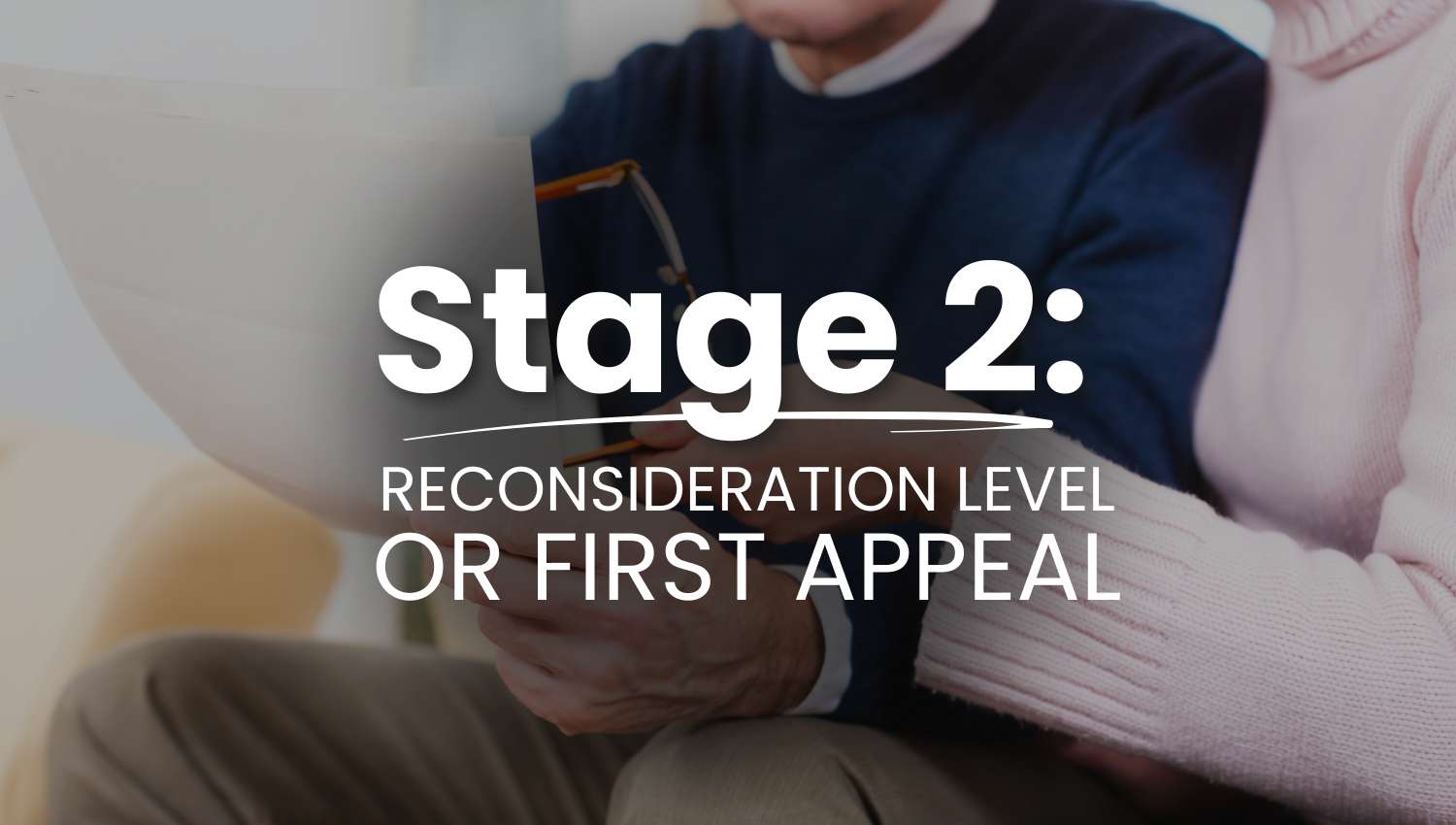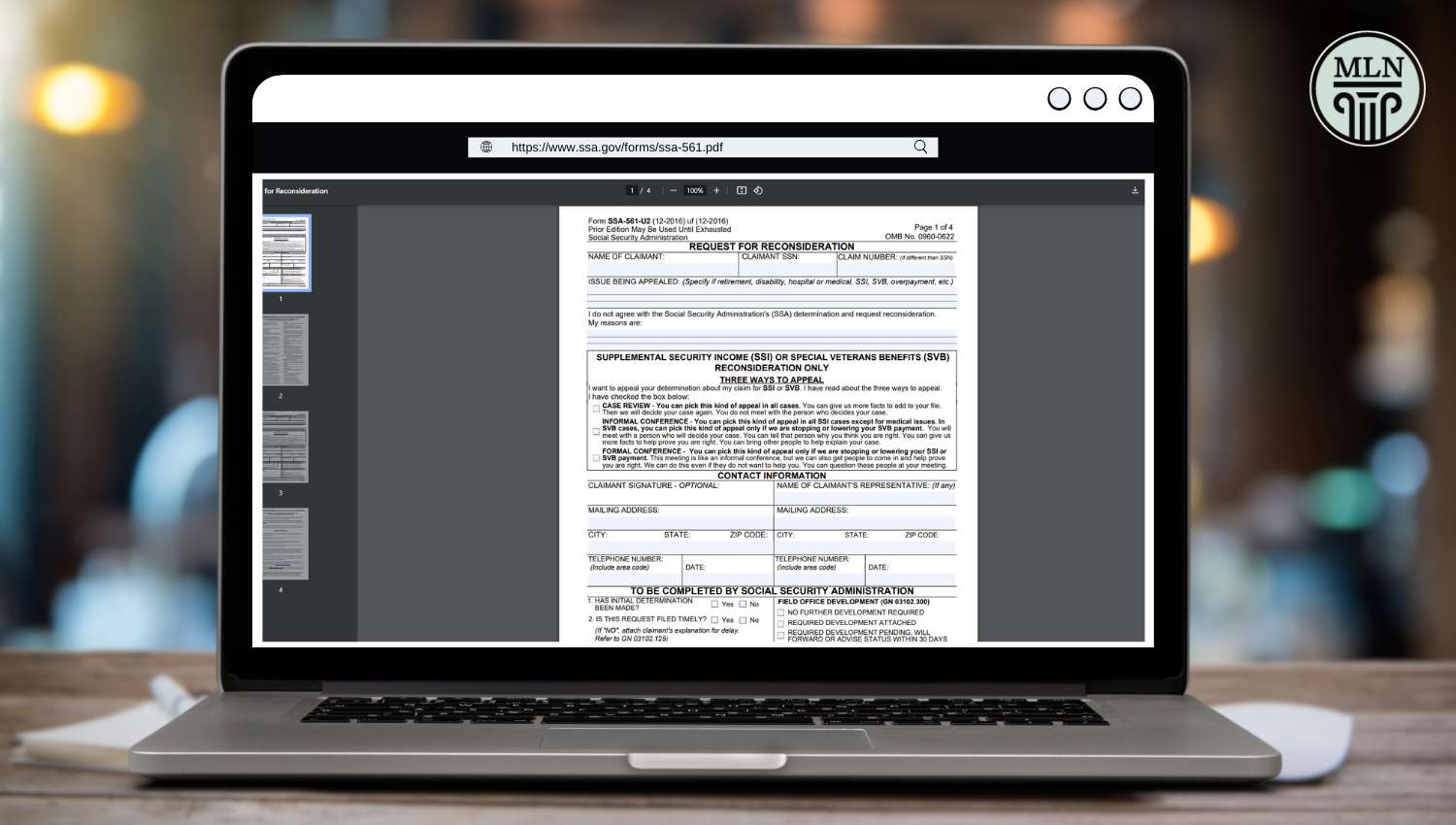
Step 2 of the SSDI Process: Reconsideration Level or First Appeal
If you are considering applying for Social Security Disability benefits, it’s important to familiarize yourself with the steps involved. The Social Security Administration (SSA) has organized the process into five distinct stages. Because the cycle of an SSD claim can be lengthy, understanding each step will help you navigate the system more effectively.
We recently discussed Stage 1: the SSDI Application Process. This article focuses on the second step in the process: the SSDI Reconsideration Process. If your first application for SSDI benefits was denied, you have the option to appeal by requesting reconsideration. This stage gives you the opportunity to present new evidence or clarify any misunderstandings about your disability that may have led to the initial claim denial.
If you have any further questions regarding the SSDI reconsideration stage or any other stage of the process, call (513) 533-2009 to speak with experienced Ohio Social Security Disability lawyer Mark L. Newman today.
What is the Next Step After Being Denied Disability?
If the SSA denies your initial disability application, the next step is to request further proceedings through the Reconsideration Level, also known as the First Appeal. This stage allows you to address any issues with your claim, provide additional evidence about your medical condition, and work to strengthen your case for approval.
However, you only have 60 days from the date of the denial letter to contact the Social Security Administration. Sometimes you miss the deadline due to circumstances beyond your control. The Social Security Administration doesn’t typically grant extensions, but, if you have missed your deadline, you’re not completely out of luck. Talk to an experienced disability lawyer like Mark L. Newman about your options.
Social Security Request for Reconsideration
To submit a reconsideration request after your initial denial, you must do so in writing using the appropriate forms provided by the Social Security Administration (SSA). The primary forms required are Form SSA-561 (Request for Reconsideration), Form SSA-3441 (Disability Report – Appeal), and Form SSA-827 (Authorization to Disclose Information).
You can complete and submit these forms online through the SSA website or by mailing them to your local SSA office. Be sure to include any new evidence or additional medical records that support your claim to improve your chances of success at this stage.

How Long Does it Take to Get a Reconsideration Decision?
A reconsideration is a complete review of your claim by someone who did not take part in the first decision. They will look at all the evidence submitted when the original decision was made, plus any new evidence you may have supplied.
The average time required to work through Step 2 (First Appeal) is between three and five months.
Social Security Reconsideration Timeline
The timeline for Stage 2 of the SSDI reconsideration request process typically unfolds as follows:
- Filing the Request: After receiving a denial on your initial application, you have 60 days to file a reconsideration request. This includes completing Form SSA-561 and submitting any updated medical evidence or employment records.
- SSA Review Period: Once you submit your form and supporting evidence, the Social Security Administration will reconsider your claim. This review can take anywhere between 3 to 5 months, depending on the complexity of your case and the backlog of cases at the SSA.
- Notification of Decision: After the review is complete, the SSA will mail you a letter with their decision. If approved, your SSDI benefits will begin. If denied again, you can proceed to the next stage of appeal, requesting a hearing before an Administrative Law Judge (ALJ).

What are the Chances of Winning a Social Security Reconsideration?
At this step, only about 13% to 15% of applicants are approved and obtain disability benefits. If you were denied at Stage 2, don’t worry. You still have plenty of opportunities to appeal this decision and obtain the benefits you need and deserve.
How to Win a Disability Reconsideration
There is no surefire way to win an SSDI reconsideration appeal, and unfortunately, the odds are that you won’t at this stage. However, to increase your chances of success, the best way is to strengthen your case with thorough documentation. This includes:
- Submitting updated medical records that clearly outline your condition, treatments, and limitations
- Providing detailed information about your work history and how your disability affects your ability to perform your job
- Include any new evidence that supports your claim and helps prove the severity of your condition
- Carefully review the reasons for the initial denial and address any missing or unclear documents to ensure a stronger case
By presenting complete and accurate information, often with the help of an experienced SSDI lawyer, you give the SSA the evidence needed to determine your eligibility and create a higher chance of approval at this stage.

Winning SSDI at Reconsideration
If you are approved for SSDI at the reconsideration level, you can expect to begin receiving benefits shortly after the Social Security Administration processes your approval.
You may also be eligible for back pay, which covers the time between when you first applied for SSDI and when your claim was approved. This money is typically paid as a lump sum and can help cover expenses incurred during the waiting period.
Once approved, you will also receive monthly disability payments moving forward.
SSDI Reconsideration Denied? On To the Next Step
If your claim is denied during the reconsideration process, don’t worry—this is a common outcome at this stage. You will receive another notice, similar to the first, explaining your right to file a second appeal.
This next step, known as Stage 3: SSDI Hearing, involves requesting a disability hearing where an Administrative Law Judge (ALJ) will decide your case. This is your opportunity to present new evidence, clarify your situation, and strengthen your case to help obtain the benefits you need.
Working with a skilled Ohio denied disability lawyer like Mark Newman can help ensure your appeal is prepared and presented effectively for the best possible outcome.

Denied Social Security Reconsideration? Cincinnati SSDI Attorney Mark L. Newman Can Help
Are you starting to see why this process is so lengthy and complex? The SSDI reconsideration process and the steps that follow, including the hearing level, require thorough preparation and a clear understanding of Social Security’s requirements.
To increase your chances of a fully favorable decision, it’s essential to have an experienced lawyer on your side who can help guide you through the process, present compelling evidence, and ensure all deadlines are met.
Whether you’re working to prove you are eligible and entitled to benefits or seeking to qualify for reconsideration, an experienced Ohio social security disability lawyer like Mark L. Newman can provide the guidance and support you need.
For more information on how to protect your rights and stay on track, schedule a consultation with Attorney Newman by calling (513) 533-2009 or completing this online intake form today.




